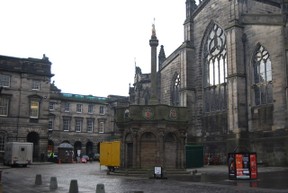 Miles away, in Edinburgh, before the battle was even fought, the citizens stood shocked and terrified. There was no source for that ghostly voice.
Miles away, in Edinburgh, before the battle was even fought, the citizens stood shocked and terrified. There was no source for that ghostly voice.
A city full of witnesses peered around the area by the Mercat. But the monotone seemed to come from Heaven itself.
The Mercat was no hidden back alley. This central location was where the merchants raised their stalls, and items of great import were communicated to the people. The surrounding buildings contained the city seats of commerce, justice and religion. Criminals were hanged by the back wall.
On the evening of September 8th 1513, a ghostly voice recited names, one after the other. It went on for hours and thousands of people heard it.
Many recognized the names being spoken. They belonged to loved ones or local noblemen, who had marched away days before to invade England. They had answered the call to arms of their king, James IV, who was doing this to aid the French.
The English would be forced to fight a war on two fronts, if both Scotland and France adhered to the Auld Alliance. While Henry VIII led his army into France, it was left to his wife Queen Catherine of Aragon - riding alongside the Earl of Surrey - to defend their realm from the Scots.
Those names, sounding across the Mercat as an unemotional litany, could be matched to live men stationed upon Flodden Hill. The Fateful clash wouldn't come until morning.
When it did, the significance of the Mercat names selected would be tragically and horrifically apparent. The spectral voice only read out those who would die.
Over 17,000 names were heard in Edinburgh on the eve of Flodden. To this day, no-one knows from whence it came.



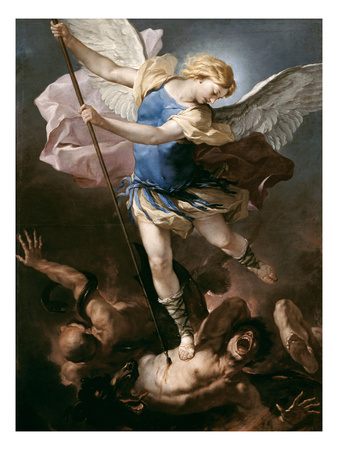
 Miles away, in Edinburgh, before the battle was even fought, the citizens stood shocked and terrified. There was no source for that ghostly voice.
Miles away, in Edinburgh, before the battle was even fought, the citizens stood shocked and terrified. There was no source for that ghostly voice.


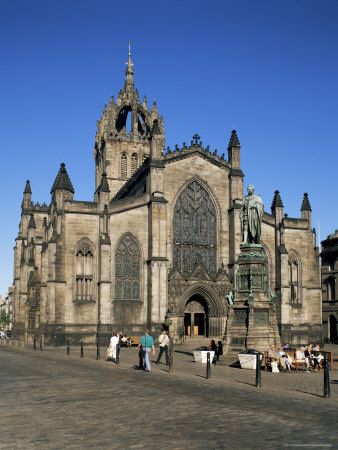



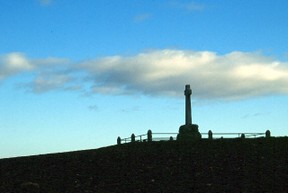 Turn left onto the B6352, from Northumbria's A697, and you are driving along a stretch of road known as the most haunted in Britain.
Turn left onto the B6352, from Northumbria's A697, and you are driving along a stretch of road known as the most haunted in Britain.











 St Tydecho's Churches in West Waleson 09/03/2014
St Tydecho's Churches in West Waleson 09/03/2014
 Goodies for an Outlander Premiere Partyon 03/06/2015
Goodies for an Outlander Premiere Partyon 03/06/2015
 Holocaust Memorial Day Interview with Rainer Höss, Grandson of Rudolf Architect of Auschwitzon 01/24/2015
Holocaust Memorial Day Interview with Rainer Höss, Grandson of Rudolf Architect of Auschwitzon 01/24/2015
 Romantic Valentine Gifts for an Outlander Fanon 01/16/2015
Romantic Valentine Gifts for an Outlander Fanon 01/16/2015

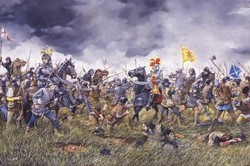

Comments
I'm looking forward to my contract with great glee. LOL
Yeah. Sometimes decisions can be fatal.
I'm wondering how to contact the History Channel. This is good stuff!!
I agree with every word of that, and so did most of the people around James IV. All of his counselors, plus his wife, were against invading England in this instance. This is why some have assumed that the 'angel' was someone dressed up. He was sent by one of James's council to try and dissuade him.
Unfortunately James wouldn't see sense on this one.
Jo, You are a qualified historian and speak as such.
Me? I'm just a peacemaker-type thinker, viewing a situation hundreds of years later way after the fact and going: "I would have figured out a way not to go to war."
I was watching an old movie the other night and the husband was sick but he was a soldier. His wife said he should ask not go back. He said that wouldn't be honorable. She said: "So what! You'd be alive and you'd be with your family!" I sided the wife. I say her logic was flawless. :) Of course the guy died and left her a widow.
I am reminded of a quote I heard in YAM - yet another movie. :) The old man says to the young manly man who is gung-ho for getting into battle, trying to urge him to reconsider his position:
- "I've taken part in many wars in my lifetime. And at the time the reason for going to war always seemed so very important. No I can't even remember what we fought them for."
Sadly, not everyone lives through a war and are around to give others such sage advice.
Bottom line? I HATE WAR!!!
(And I'm sure you do too, Jo. We are sister peacemakers.)
Please don't get me started on Syria!
frankbeswick - He could have dismissed Margaret Tudor as a tender hearted woman, who knew nothing of politics.
I think that James IV regretted not listening to Mother Mary, when he was dying on Flodden battlefield, in the midst of the worst battlesite massacre of Scots ever.
cmoneyspinner - It wasn't a matter of friendship. It was a matter of chivalry, which was very important back then. If he didn't come to the aid of the lady, then he wasn't a gentleman and possibly not even a man. (Beyond the biology.)
They most definitely were real, but it wasn't a friendship. it was part of the Auld Alliance between Scotland and France, where one would always come to the aid of the other. If James IV didn't help France now, then he couldn't count on France helping next time England invaded them!
It was politics, chivalry and pride.
Yet the king's wife, to whom he had a greater and more lasting commitment than he had to the queen of France, beseeched him not to go to war. Should he not have preferred her counse to that of the queen of France?
Let's presume that there is some truth in the angel legend. If Mary the mother of Jesus, who is pretty close to God, sends you a message, you had better listen. She is a very senior person.
Yes he probably said that he had committed to the Queen, but if he really had a good relationship with the Queen he could have confided in her, told her he had a change of heart and would she allow him to choose an alternative plan. What are friends for?
These are real people we're talking about. Real people who can and should have been able to talk to each other. Leaders of countries talk to each other all the time. Game changers happen!! Plans for war can get changed. At least ... that's what they say in the documentaries I watch. (O.o)
I say it was the king's pride. I'm done!
(Jo, you know what a hard head I am. Don't try to change my opinions with facts.) :)
That's precisely what he told his advisors and friends. He had already committed to helping the Queen of France, and his chivalry wouldn't let him desert her, when she'd asked him personally.
I believe in angels. I also believe the human mind is quite powerful. In the case of James, I think he had deep-seated misgivings about going to war and wasn't himself fully DECIDED, but had already COMMITTED to it. At that point, his pride wouldn't let him back down even if it was the right thing to do. "Pride goes before destruction." :)
That's my take. He's dead now. We'll never know!